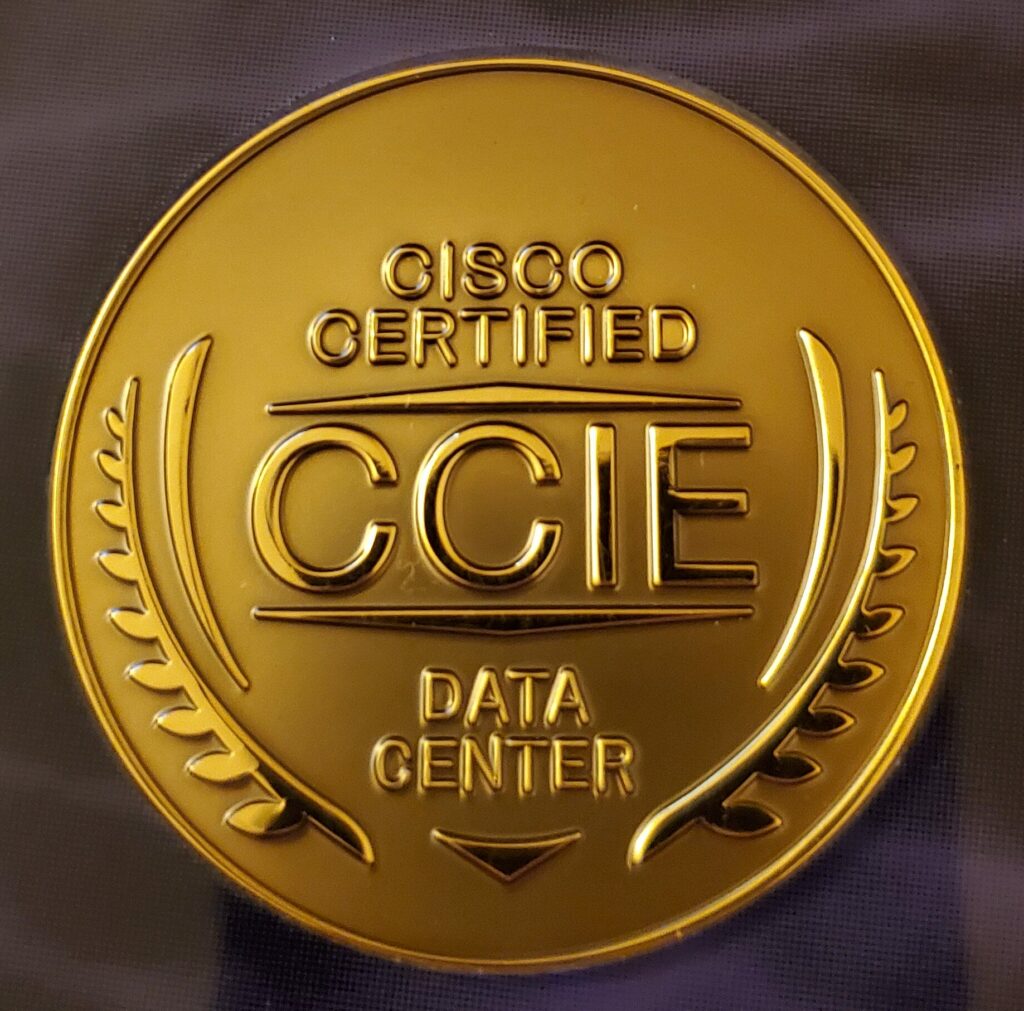Cisco’s New CCIE Program
June 19, 2019

On June 10th, 2019, Cisco announced a complete overhaul of the Cisco certification Programs which will go live on February 24th, 2020. I’ve covered the updates to the CCNA, CCNP, and Specialist programs in a prior blog post. In this posting, I’ll go over what is changing in the CCIE program.
The Cisco Certified Internetwork Expert program has received small, but significant changes that anyone considering, working towards, or holds needs to be aware of. At its core, the CCIE program still consists of a written exam and a lab exam, but the composition of each of these exam types is changing.
Expert level concentrations:
In the new CCIE program, the concentrations available are:
- CCIE Enterprise Infrastructure
- CCIE Enterprise Wireless
- CCIE Data Center
- CCIE Security
- CCIE Service Provider
- CCIE Collaboration
The first noticeable change on the list is that the CCIE Routing & Switching, and the CCIE Wireless have been changed to CCIE Enterprise Infrastructure and CCIE Enterprise Wireless respectively. In the announcement for the new program, Cisco stated that there will be a design element incorporated into each of the new CCIE concentrations. However, unlike the CCDA & CCDP certifications, which are going away with the ability to get a Design Specialist certification in either the Enterprise or Data Center concentrations, the CCDE will remain with only minor changes to the recertification process.
Earning a CCIE in the new program:
To earn a CCIE in the new program, you will first need to pass a written exam to qualify for the lab exam. What’s changed is that the written exam is the Core exam for the CCNP concentration. This now means that in the process of earning your CCNP, you will qualify and be able to take the CCIE lab exam. The Core exams that qualify for the CCIE are:
- CCIE Enterprise Infrastructure: Implementing and Operating Cisco Enterprise Network Core Technologies (ENCOR)
- CCIE Enterprise Wireless: Implementing and Operating Cisco Enterprise Network Core Technologies (ENCOR)
- CCIE Data Center: Implementing and Operating Cisco Data Center Core Technologies (DCCOR)
- CCIE Security: Implementing and Operating Cisco Security Core Technologies (SCOR)
- CCIE Service Provider: Implementing and Operating Cisco Service Provider Network Core Technologies (SPCOR)
- CCIE Collaboration: Implementing and Operating Cisco Collaboration Core Technologies (CLCOR)
The major standout in the CCIE core written exams is that the CCIE Enterprise Infrastructure and the CCIE Enterprise Wireless exams are the same. When you pass the ENCOR exam, you will then have a choice in which lab exam you take, and your lab exam determines whether you receive the Infrastructure or Wireless CCIE certification.
Looking at the Lab exams, it is straight forward, there is a lab exam associated with each CCIE concentration.
- CCIE Enterprise Infrastructure: CCIE Enterprise Infrastructure Lab
- CCIE Enterprise Wireless: CCIE Enterprise Wireless Lab
- CCIE Data Center: CCIE Data Center Lab
- CCIE Security: CCIE Security Lab
- CCIE Service Provider: CCIE Service Provider Lab
- CCIE Collaboration: CCIE Collaboration Lab
Except for the Enterprise Infrastructure and Enterprise Wireless programs, the lab exam you are permitted to take is determined by the Core written exam that you passed. This is unchanged from the current program where if you pass a CCIE Security written exam, you must take the CCIE Security Lab exam. As noted above, the Enterprise Infrastructure and Enterprise Wireless use the same Core exam and from there you will be able to choose from the two different lab exams.
When it comes to the lab exam itself, Cisco is changing the structure of the exam. In the new certification program, you will need to complete two modules of the lab exam. The first module is a 3-hour design module, and the second module is a 5-hour deployment module. Each module will have two key score numbers, a minimum score and a passing score. To pass the Lab exam and earn a CCIE in the new program, you will need to achieve at least the minimum score for each module and the combined overall passing score for the Lab Exam.
| Design Module Score | Deployment Module Score | Overall Exam Score | Result |
|---|---|---|---|
| Below minimum | Below minimum | Below Pass | FAIL |
| Above minimum | Below minimum | Below Pass | FAIL |
| Below minimum | Above minimum | Below Pass | FAIL |
| Above minimum | Below minimum | Above Pass | FAIL |
| Below minimum | Above minimum | Above Pass | FAIL |
| Above minimum | Above minimum | Below Pass | FAIL |
| Above minimum | Above minimum | Above Pass | CCIE |
Recertifying your CCIE & CCDE:
The major change to the CCIE and CCDE recertification process is that the recert time has changed from two years to three years. However, there are other noteworthy changes to look at. Currently an expert certification that is not recertified within two years goes into a suspended status for a year and if not renewed by the end of the third year, the certification expires. In the new system, the suspended status is converted into the third year of the certification’s active period, which makes the renewal date much more important as the cert will expire if not renewed buy the end of its active period.
There is also another change to the expert level recertification process that is buried on page 13 in the FAQ document on the new certification program. It reads (formatting added for emphasis):
Q: Is my 3-year certification cycle based on my original certification date or based on the date that I most recently recertified?
A: Your certification status will be active for three years from when you earn your certification. Each time you complete recertification requirements, your certification status will be extended for an additional three years from the date you recertify. This marks a change for CCIE certified individuals, as previously CCIE certification was active for 2 years, and each recertification event extended certification status for an additional two years from the original certification date. For reference, here’s an example of how the new recertification cycle will work:
Certified: Feb 1, 2019 -> expiration: Feb 1, 2022
https://www.cisco.com/c/dam/en_us/training-events/training-certification-faqs.pdf
Recertify: Nov 1, 2019 -> expiration: Nov 1, 2022
Recertify: Aug 1, 2020 -> expiration: Aug 1, 2023
Currently, as a CCIE, your recertification date is every two years from your CCIE anniversary date. For example, I earned my CCIE on July 20th, 2015 and my renewal date was always July 20th of odd numbered years. I just recently renewed my CCIE as it was coming due in July of 2019, and it is now good until July 2021 (2022 with the third year of the new program). But once the new program goes into effect on February 24th, 2020, if I renew my CCIE on February 25th, 2020, then I will see the new recertify date as February 25th, 2023, and not July 2025.
One more note regarding CCIE/CCDE recertification, there are changes in the usage of Continuing Education (CE) credits that you can use for your renewal. Under the current system, you need 100 CE credits to renew a CCIE. The new certification program will require 120 CE credits. Also, under the current system, you are limited to 70 CE credits from Cisco Live participation and 20 credits from content authoring. The Cisco Live & content authoring caps will be removed in the new program.
| Duration | Exam Recertification | Exam + Continuing Education (CE) | Continuing Education (CE) |
|---|---|---|---|
| 3 Years |
|
| Earn 120 CE credits |
As mentioned with the other certifications, if you are working towards a new cert, keep going. But, when it comes to the CCIE, here’s my take. If you have a CCNP and are looking at getting a CCIE, study and take the written exam before February 2020. If you do not have a CCNP, but want to get a CCIE after the NP, you may want to wait to get your CCNP until the new program takes effect, that way your CCNP core exam will qualify you for the CCIE lab.
If you have recently passed the CCIE written exam and are preparing for the lab exam, you should consider studying for the new lab in your concentration area and take it after February 24th, 2020. If you are about to take the lab or you have made lab attempts and have not passed yet, keep going and try to pass the lab before the new program starts and the lab exams change.
Keep studying, Keep Learning. Keep improving yourself.

